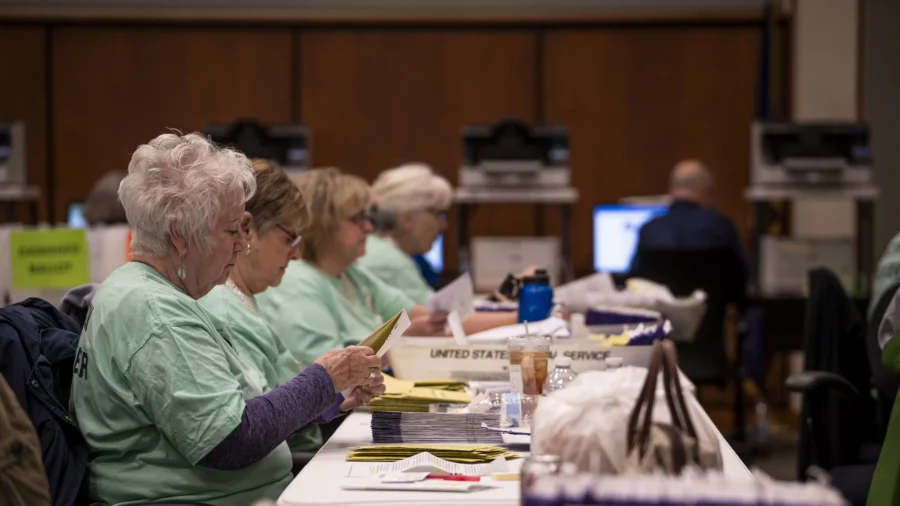Pennsylvania voters went to the polls in the state primary on Tuesday, but the turnout was low in many precincts, with many uncontested races on some ballots. Some voters took the opportunity to pick up campaign yard signs that they will put in their yards to promote their favored candidate during the coming election season. Party members often sit near the door of polling places, show voters the ballot, advocate for certain candidates, and sometimes hand out yard signs.
The presidential race was a foregone conclusion, with President Joe Biden taking 93 percent of the Democrat votes, and former President Donald Trump earning 84 percent to get the Republican nod. Also still on the ballot in Pennsylvania were Democrat Dean Phillips with seven percent and Republican Nikki Haley, who received 17 percent of the votes, although both have left the race.
Some voters mistakenly assume that if a name appears on a ballot, the candidate is a viable option. This is the state that, in 2022, elected a Democrat, former state Rep. Anthony DeLuca, 85, a month after he died, because his name was on the ballot. So, his challenger lost to a dead man.
Independents do not get to vote in the Pennsylvania primary. There has been some past legislative action to change that, but as it stands, voters must be registered with a party to vote on that party’s ballot. Candidates can usually count on support from reliable voters who register with a major party and vote in low-turnout elections. They want to win over Pennsylvania’s 1,326,386 unaffiliated voters.
With 3,894,977 registered Democrats and 3,498,954 registered Republicans, the difference between the two major parties is only 396,023 voters, according to most recent Department of State numbers. That is what makes Pennsylvania such an attractive swing state for candidates, any party could win if they convince enough unaffiliated voters.
Counties start to tally mail-in ballots on election morning, and those results are posted shortly after the polls close. In-person votes take longer to count, so mail-in results don’t tell the entire story.
Congressional Races
With 985,138 votes, Democrat Sen. Bob Casey will face Republican Dave McCormick, who earned 867,886 votes. They meet in the general election. Neither was challenged by other party members. They have been making some moves around the state, waiting out the primary, but that campaign, like all the others, is about to ramp up for the main event.
After some rough advertising in the 1st Congressional District, Republican Rep. Brian Fitzpatrick won with 61 percent of the votes. Fitzpatrick is an attorney and former FBI agent who has served as a U.S. representative from Pennsylvania since 2017.
Republican challenger Mark Houck had 39 percent of the votes. Mr. Houck made national news after roughly 25 FBI agents arrested him at gunpoint in his home in 2022 for an alleged violation of the Freedom of Access to Clinic Entrances (FACE) Act.
A sidewalk counselor at a Philadelphia abortion clinic, Mr. Houck allegedly pushed a clinic volunteer after the man allegedly made vulgar comments to Mr. Houck’s son. Local police refused to bring charges in the case, but the U.S. Department of Justice said the shove was a FACE violation. He faced federal prison. A jury found Mr. Houck not guilty. He ran in part, to make prevent such FBI activity against others.
Mr. Fitzpatrick faces Ashley Ehasz, a Democrat, in the general election.
In the 10th Congressional District, Republican incumbent U.S. Rep. Scott Perry was unchallenged and earned 100 percent of the votes, but there were six Democrats vying for the chance to represent their party in the general election. Janelle Stelson, a Democrat and former Pennsylvania television news anchor, earned the ballot spot with 26,464 votes in the fall.
The other Democratic hopefuls included Mike O’Brien, a retired Marine Corps lieutenant colonel and F-35 Stealth Fighter pilot; Rick Coplen, a West Point graduate, parachute combat veteran, teacher, and school board member; Blake Lynch, a former community relations director; Shamaine Daniels, a Harrisburg City Council member and immigration attorney who ran against Mr. Perry in 2022; and John Broadhurst, an entrepreneur and businessman.
In Pennsylvania’s District 7, unchallenged incumbent Democrat, U.S. Rep. Susan Wild, had three Republicans trying to take her seat. She will face Republican State Rep. Ryan MacKenzie in the general election. Mr. Mackenzie received 43 percent of the votes.
The other Republicans in this race were Kevin Dellicker, a small business owner, veteran, and former environmental policy adviser to Pennsylvania Gov. Tom Ridge; and Maria Montero, an attorney and former executive director of the State Commission on Women.
State Races
Pennsylvania also had some important state races. When Gov. Josh Shapiro, a Democrat, won the governorship, he vacated the state attorney general position. For the Republicans, Dave Sunday from York County, who received 71 percent of the votes, will represent them on the ballot. Craig Williams from Delaware County received 30 percent of the votes.
Democrats had five candidates: Eugene DePasquale of Allegheny County won the race with 36 percent of the votes, followed by Jack Stollsteimer of Delaware County with 20 percent, Joe Khan of Bucks County with 16 percent, Keir Bradford-Grey of Philadelphia County with 15 percent, and Jared Solomon, also of Philadelphia County, with 13 percent.
For auditor general, two Democrat candidates, Malcolm Kenyatta of Philadelphia County and Mark Pinsley of Lehigh County, were looking to unseat unchallenged Republican Tim DeFoor of Dauphin County. With 64 percent of the votes, Mr. Kenyatta will run in November for Democrats.
State Treasurer Stacy Garrity of Bradford County, a Republican, was unopposed in her party.
Two Democrats ran for the ballot position, Erin McClelland of Allegheny County and Ryan Bizzarro of Erie County. Ms. McClelland won the primary and will face Ms. Garrity in November.
From The Epoch Times

